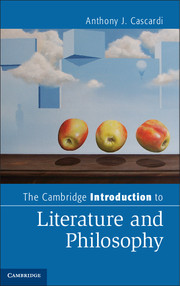Afterword - Limits
Published online by Cambridge University Press: 05 June 2014
Summary
What starts philosophy is no more to be known at the outset than how to make an end of it.
Stanley Cavell, The Claim of Reason, 3The topics we’ve discussed across the previous chapters will have helped to make it clear that the relations between literature and philosophy are not neatly contained by preconceived dei nitions of what philosophy and literature are. Given all the intersections between them, does it make sense to think of their independent identities as anything more than illusory or vestigial? Perhaps we should always put the terms “literature” and “philosophy” in scare quotes as a way to recognize that while these designations may indicate what each thinks of itself, they are at best provisional names whose boundaries change. To expect otherwise would entangle us in a project of definitions where instead a genealogy, a tracing of relations would be in order.
That genealogy would also have to include the many examples of boundary-crossing that have kept these questions alive for so long. Formal innovation was a way that Nietzsche and Derrida (among others) saw it possible to engage in a critique of metaphysics. For Derrida, the recourse to a new kind writing seemed necessary because he believed it was impossible to step wholly outside of the inheritance that he wanted nonetheless to question. Among his tactics was the bracketing and crossing out of some of the principal terms associated with metaphysics, placing them “under erasure” (sous rature). This practice, inherited from Heidegger, was a way to put pressure on inherited philosophical categories while recognizing that the attempt to “overcome” them completely was bound to fail. Nietzsche’s genealogical approach, especially in the way it was adopted by Michel Foucault, tackles a similar issue. Rather than first pondering principles and the nature of essences, the genealogist’s practice is one of critical questioning; the point, as Rorty puts it, is to ask “whether these great ideas really came from the good background they never tired of claiming for themselves.” Kierkegaard and Wittgenstein were likewise form-breakers, as were the writers of the avant-garde (Stein, Beckett, Brecht, etc.). Form-breaking – sometimes known as iconoclasm – has a long history across both literature and philosophy. But we should be careful to consider what can be expected of it. Adorno observed that the avant-gardes tends to quickly become the next orthodoxy.
- Type
- Chapter
- Information
- The Cambridge Introduction to Literature and Philosophy , pp. 181 - 188Publisher: Cambridge University PressPrint publication year: 2014

